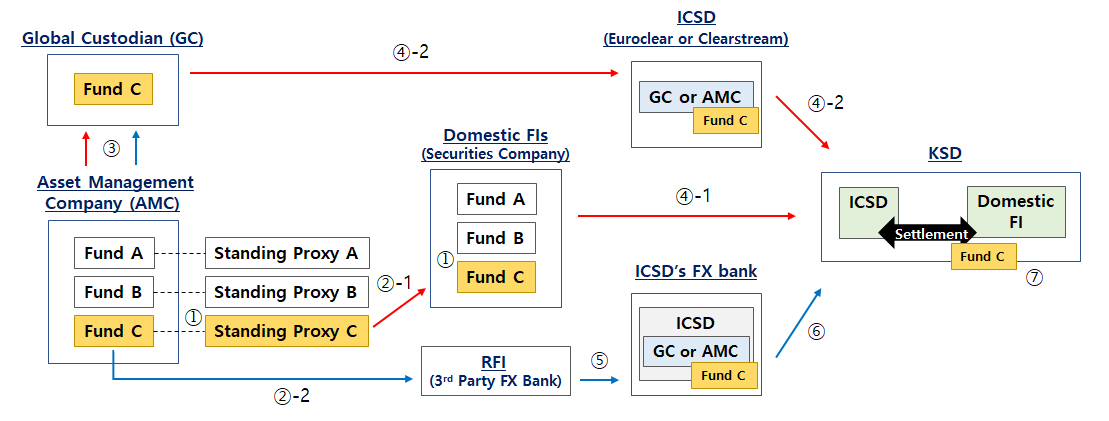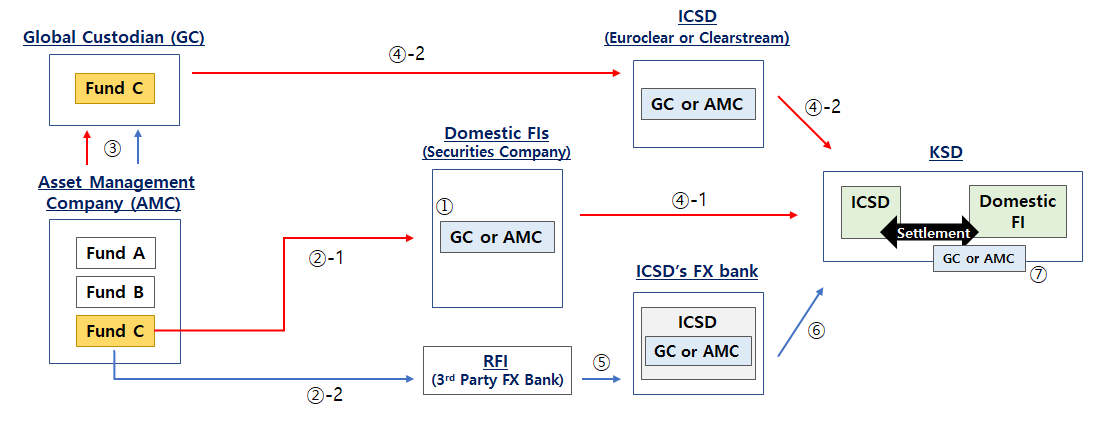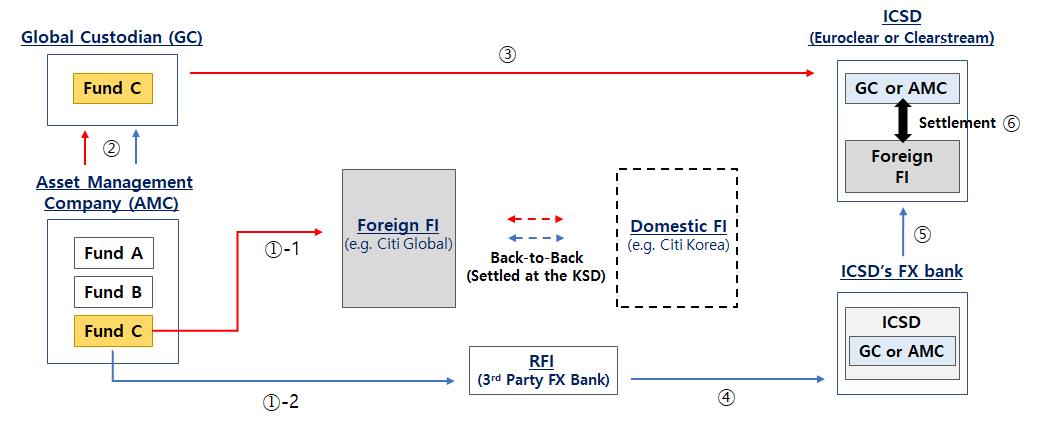▶ Omnibus accounts for KTBs/MSBs and FX transactions under the names of global custodians or asset managers will be fully available, replacing the current system that requires fund-by-fund segregation.
▶ Market making by global banks will be fully liberalized to provide liquidity for offshore investors.
▶ Process for tax exemptions will be significantly streamlined.
On January 2nd, 2024, the Ministry of Economy and Finance, the Financial Services Commission, the Bank of Korea, the Financial Supervisory Service, and the Korea Securities Depository, jointly announced a plan to revamp KTB investment frameworks for offshore investors to advance accessibility in line with global standards.
The Korean government has consistently overhauled its investment framework to assist offshore investors in activating investments before forthcoming addition of Korea government bonds to the FTSE World Government Bond Index on November 2025. Measures announced today are aiming at improving the framework so that it becomes more conducive to various types of investors, and more adaptable to different investment environments. Major changes are as follows:
(1) Omnibus accounts for KTB/MSB and FX transactions will be fully available.
The International central securities depositories (ICSDs), Euroclear Bank and Clearstream Banking, launched their operations for Korea Treasury Bonds (KTBs) and Monetary Stabilization Bonds (MSBs) last June. In response, the Korean government has revised the Foreign Exchange Transactions Regulations so that offshore investors do not need to open their own bank accounts separately when they hold and settle KTBs/MSBs within Euroclear Bank or Cleastream Banking.
However, they were still required to open separate securities accounts in Korean securities companies to trade KTBs/MSBs, and provide their own identifiers, either Investor Registration Certificates (IRC) or Legal Entity Identifiers (LEI), for wire transfers and fund instructions when trading. This was because the overall investment framework was established on a segregated system, where individual fund-level identifiers (beneficial owner-level information) were required to proceed with KTBs/MSBs settlements at the Korean Securities Depository, after matching KTBs/MSBs transactions and foreign exchange transactions fund-by-fund. Accordingly, trading, reporting, and monitoring systems were all based on segregated accounts and individual identifiers. Such investment framework was found to have hindered some offshore investors from accessing Korea government bonds market.
The Korean government will take measures to modify the overall system so that no individual fund-level identifiers are required for trading, reporting, and monitoring when they make transactions via ICSDs. Fully functioning omnibus accounts under the names of global custodians and asset managers for KTBs/MSBs trade and foreign exchange transactions will be available starting mid-January, 2025. Global custodians and asset managers will be permitted to trade, hold, settle, and report transactions under their own names on behalf of their clients, who are the beneficial owners, enabling offshore investors to access Korea government bonds more conveniently.
(2) Market making activities of global banks to provide liquidity will be fully liberalized.
It is a common practice for offshore investors to trade bonds under so-called “Global Operating Model”, where the investors face offshore entities of global banks as clients to buy bonds, and the position of the offshore entities is sourced from onshore dealers, often their affiliates but not necessarily, through back-to-back trades. Meanwhile, it was not clear whether such practice was feasible in Korea, as it has never been clarified whether offshore entities are free from bond short-selling restrictions, and whether the ensuing sourcing activities of onshore dealers fall within their remit or that of the brokers.
The Korean government is preparing measures to support global banks to provide KTBs/MSBs liquidity to offshore investors along with the global operating model, including through revising regulations and establishing clear guidelines. Their active market making activities would facilitate offshore demands by supporting better access to Korea government bonds market. The details of regulation revision and the guidelines are expected to be disclosed early January, 2025.
(3) Process for tax exemptions will be significantly streamlined.
Non-residents and foreign corporates are exempt from taxes on interest income and capital gains from KTBs/MSBs investment. However, in practice, several steps are required for offshore investors and financial institutions to be eligible for tax exemptions. For offshore investors who invest via ICSDs, the process will be significantly simplified starting January 2025 as below.
① QFI registration requirement.
According to the current laws, all intermediate custodian foreign financial institutions (CFIs), and foreign corporations that perform custody services or related investor services, had to be approved as qualified foreign intermediaries (QFI) by the National Tax Service (NTS) of Korea prior to holding bonds on behalf of their clients. If CFIs had an underlying client who is also holding securities on behalf of their third parties, they also had to make sure their client to be approved as a QFI. Such regulation has seriously delayed QFI registration and investment activation, as CFIs had to identify series of underlying QFIs.
A new QFI system will be launched starting January 1st, 2025, as pre-announced in the revised ‘Enforcement Decree of the Corporate Tax Act’ on 18th December. Under the new system, only ICSDs are required to be approved as a QFI, and other CFIs are not. As Euroclear Bank and Clearstream Banking have already obtained QFI status, it means that no more QFI approval will be required.
② Submission of application, reporting of Transaction/Holding streamlined
Under the current regulations, offshore investors are required to submit application forms for tax exemption and certificates of residence to their QFIs, and then QFIs need to deliver them to ICSDs so that they submit them to the NTS via KSD. Also, ICSDs are obliged to report statement of transactions and holdings of government bonds with fund-by-fund breakdowns on a monthly basis to KSD. The report includes information on the date/amount of acquisition, holding periods, date/amount of transfer, etc. for each individual fund identifiers.
Going forward, in line with the introduction of fully-functioning omnibus account, the process will be revised so that no individual fund-level information is required for transactions. CFIs are expected to collect and hold the certificates of residence of their clients, but submit them to ICSDs only when requested by NTS ex-post. Similarly, monthly statements of transactions and holdings are submitted to the NTS only when requested. The new process will also be introduced during February, 2025.
* Offshore investors are still expected to submit application forms for tax exemption to NTS, just one time before they first receive interest income or capital gains.
The Korean government aims at finalizing all regulation/system changes and guideline publication before the end of January 2025. Alongside legal improvements, the government will also actively cooperate with global banks and foreign financial institutions to ensure its new system accommodates various needs of different types of investment vehicles and diverse offshore investors.
|
REFERENCE |
Transactions and Settlement Procedures for Trading KTBs |
→ KTB Flow → FX Flow
1. Current Procedures

① The Asset Management Company (AMC) appoints a domestic standing proxy, completes the KYC process, and opens securities account for each fund.
②-1 Fund C conducts KTB transaction through the domestic standing proxy.
②-2 Fund C conducts FX transaction directly with an RFI.
③ The AMC notifies the Global Custodian Bank (GC) of the KTB and FX transactions.
④-1 The Domestic FI reports the KTB transaction details to the KSD, including Fund C’s identifier*
* IRC(Investment Registration Certificate) or LEI(Legal Entity Identifier) number
④-2 The ICSD reports the KTB transaction details to the KSD, including Fund C’s identifier.
⑤ The RFI transfers KRW, including Fund C’s identifier, to the ICSD’s FX bank.
⑥ The ICSD’s FX bank completes the payment under Fund C’s identifier.
⑦ Settlement is completed when the KTB transaction and payment are matched based on Fund C’s identifier.
>> All transaction procedures are carried out under the name of each Fund. |
2. After Introducing the Omnibus System : Direct Transaction with Domestic FIs

① The GC or AMC opens nominee account in its own name on behalf of each fund.
②-1 Fund C conducts KTB transaction directly with a Domestic FI.
②-2 Fund C conducts FX transaction directly with an RFI.
③ The AMC notifies the GC of the KTB and FX transactions.
④-1 The Domestic FI reports the KTB transaction details to the KSD, including the identifier of the GC or AMC.
④-2 The ICSD reports the KTB transaction details to the KSD, including the identifier of the GC or AMC.
⑤ The RFI transfers KRW, including the identifier of the GC or AMC, to the ICSD’s FX bank.
⑥ The ICSD’s FX bank completes the payment under the identifier of the GC or AMC.
⑦ Settlement is completed when the KTB transaction and payment are matched based on the identifier of the GC or AMC.
>> All transaction procedures are carried out under the GC or AMC, without the need for each fund’s identifier. |
3. After Introducing the Omnibus System : Using Global Operation Model

①-1 Fund C conducts KTB transactions with a Foreign FI, which is an ICSD client.
* The Foreign FI position is cleared through back-to-back transaction with domestic FIs
①-2 Fund C conducts FX transactions directly with an RFI.
② The AMC notifies the GC of the KTB and FX transactions.
③ The GC notifies the ISCD of the KTB and FX transactions.
④ The RFI transfers KRW, including the identifier of the GC or AMC, to the ICSD’s FX bank.
⑤ The ICSD’s FX bank notifies the ICSD of the payment receipt.
⑥ Internal Settlement of KTB transactions between the GC or AMC and the Foreign FI is completed within the ICSD.
>> The internal settlement procedure within the ICSD is also carried out under the name of the GC or AMC, without the need for the identifier of each fund. |
Please refer to the attached files.
